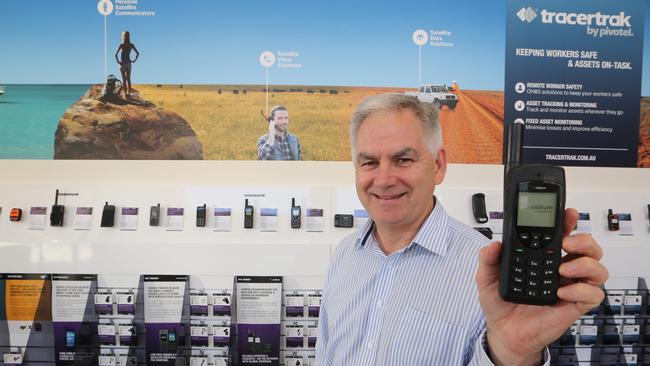Success is calling for Gold Coast communications firm Pivotel
“BIGGER is better” isn’t a saying applicable to Southport-based communications company Pivotel.

Business
Don't miss out on the headlines from Business. Followed categories will be added to My News.
“BIGGER is better” isn’t a saying applicable to Southport-based communications company Pivotel.
Founded in 2002 by Peter Bolger and business partner Robert Sakker, the business, which has about 70 employees, is going up against major listed players in the highly-competitive industry and winning.
Pivotel provides 65,000 mobile and satellite phone and data services across Australia.
It competes with telecommunications giants such as Telstra and services customers in remote and rural communities through its network of satellite operators including Thuraya and US-based Inmarsat and Iridium.
COAST'S POLITICAL DONORS REVEALED
The company recently expanded into the North American market, purchasing Tennessee-based Global Marine Networks.
Mr Bolger, an ex-Vodafone executive who headed up the company’s mobile satellite division called Globalstar, formed Pivotel with Mr Sakker when Globalstar was spun off from Vodafone.
The company, which back then used Globalstar’s network of low-earth-orbit satellites for tracking purposes, saw rapid growth in its first four years.
“It then went through a period (2007-2011) where we had to really look after that business (Globalstar) because of satellite problems,” he said.
“The problem was, being on the Globalstar satellite, we had to spend a lot of time and money looking after our customers and migrating as many as we could from the Globarstar business to the Iridium business we linked to in 2008.”
Pivotel did a deal with Thuraya in 2008 and Imaset in 2012, meaning it now markets four technologies.
Mr Bolger said Pivotel has experienced strong growth in the past two years and is expanding its services, particularly in the satellite communications market.
Its acquisition of GMN was a strategic move to tap into the American company’s products, which provide solutions to issues with slow and expensive satellite data downloads.
Mr Bolger said using satellite data is significantly more expensive than mobile or broadband data.
“It was the data solutions that GMN was developing, particularly for the maritime industry, that we see as a big opportunity. We see growth in mobile satellite data as land-based services.”
Mr Bolger said what GMN provided as “data modified services” whereby the data available was not increased, but used more efficiently.
“It is trying to transmit the least amount of data, just what you materially want,” he said.
“So if you think about an email, it is the contents of the email, not everything that it is carried in, that you really want. So we have modified services around that.”
Another opportunity for the company involves building mobile phone towers to service businesses in remote areas, such as mines and farms, where there are black spots or poor coverage.
SUBSCRIBE FOR LESS THAN 50c A DAY
Mr Bolger said Pivotel can build the towers far cheaper than the large telecommunications companies.
He said that was because they targeted one business or operation, whereas the bigger players, aimed for more site coverage so they could serve a larger area and tap into government subsidies.
“We’re not trying to build this mass coverage around Australia, like Telstra or Optus, this is very targeted, and we build the towers for 10 to 20 per cent of the cost that a big telecommunications company pays.”
Mr Bolger said the plan to build more purpose-built towers, called ecoSphere, is one he believes could be exported around the world.


